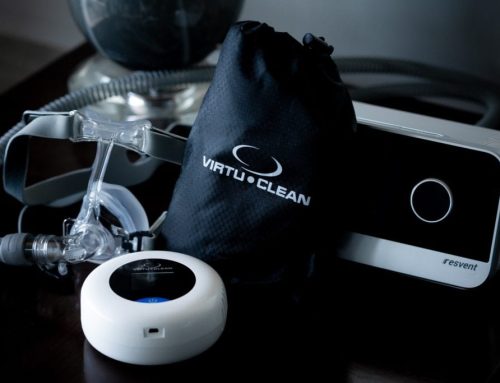Table of Contents
What Are Sleep Trackers and How Are They Used?
When you suffer from apnea, there are many techniques and tools you can use to improve the quality of your sleep.
One of the most effective is a CPAP machine. By ensuring that you get regulated air throughout the night, a CPAP machine can treat apnea and ensure that you rest easy. Combined with a CPAP cleaner device, you’ll enjoy healthful sleep as you work on underlying problems that could be causing apnea.

In addition to medical devices, there are other complementary ways to help monitor and treat apnea. Many apnea sufferers have turned to sleep trackers to analyze their sleeping patterns. While some claim that trackers can determine whether CPAP treatment is working, others believe that they’re not accurate enough.
Let’s take a closer look at these devices and find out the truth.
What is a Sleep Tracker?
When you first started using a CPAP machine, you were probably unfamiliar with CPAP cleaners. However, over time, you learned the benefits and now understand their value.
Likewise, learning more about a sleep tracker can help you to decide whether you need one.
A sleep tracker is a smart device worn on the wrist that detects when you sleep, and how long you sleep for. Some trackers are incorporated into other devices, such as smartwatches and fitness bands. Dedicated sleep trackers only monitor sleep and report the details back to your smartphone.
To clarify, let’s break this down. Trackers may be:
- Standalone devices designed specifically to track your sleeping patterns
- Multi-use fitness or activity trackers that monitor your sleeping patterns
Are Sleep Trackers Effective?
To determine how accurate sleep trackers are, we need to consider how they work. All devices rely on the same technology, whether you are looking at a standalone tracker or a multi-use fitness or activity tracker.
An accelerometer within the device detects movement. In fact, the accelerometers used today are quite advanced, with the ability to determine the direction and intensity of movement. An algorithm then looks at this movement to decide whether you are asleep, awake, or in a disturbed state (such as an apnea sufferer who moves and coughs during the night).
Of course, moving doesn’t necessarily indicate that you are awake. Some people who don’t suffer from apnea still toss and turn during the night, even when they are getting high-quality sleep. This means that sleep trackers are inherently inaccurate, especially if they only use an accelerometer for monitoring.
Instead of an accelerometer, some sleep trackers use radio waves to detect whether you are sleeping or not, but these radio waves are still only designed to detect basic movement.
Is Movement Enough to Indicate Sleep Quality?
The software algorithms behind sleep trackers make a basic and somewhat inaccurate assumption: if you are moving, you aren’t sleeping. However, we’ve already noted how movement doesn’t necessarily indicate poor quality sleep.
While sleep trackers may detect periods of restlessness that indicate poor sleep quality, it’s not a guarantee. The tracker doesn’t know whether or not you are actually sleeping, no matter how advanced of an algorithm it uses. You should think of trackers as providing an estimate of your sleeping patterns, but you should also always take the results with a grain of salt.
The only way to effectively track your sleep is at a clinic under the direct supervision of a physician.
How do ‘Real’ Sleep Trackers Work?
 If you were to visit a sleep clinic, you would undergo an examination called a polysomnogram. During this test, body movement is only one metric used to calculate the quality of your sleep. A range of sensors also track your breathing, heart rate, brain activity, individual limb movement, blood oxygen saturation, and your physical position.
If you were to visit a sleep clinic, you would undergo an examination called a polysomnogram. During this test, body movement is only one metric used to calculate the quality of your sleep. A range of sensors also track your breathing, heart rate, brain activity, individual limb movement, blood oxygen saturation, and your physical position.
Additionally, staff is also on hand to make visual observations, allowing for a highly accurate assessment of your sleep quality.
The Conclusion
When you are considering a sleep tracker, you must keep some things in mind.
- Consumer sleep trackers only detect movement, which is not an accurate indication of sleep quality.
- Clinical sleep tracking relies on a host of sensors and observations.
- The only way to truly track your sleep is by talking to a specialist and booking into a clinic for overnight monitoring.
This isn’t to say that sleep trackers don’t have value. When you are using a CPAP machine but are concerned that it isn’t working properly, you can use a tracker to give you a rough indication of movement during the night. You can then present this information to your physician, who will perform a proper diagnosis.
Unlike sleep trackers, some medical devices are known to work. Take CPAP cleanersfor example. With a cleaner, you can sterilize your CPAP mask daily. CPAP cleaner technology is proven, widely understood, and can remove up to 99% of pathogens and bacteria from your equipment. The efficacy of a CPAP cleaning machine is not debatable.
Unfortunately, consumer sleep trackers just aren’t on the same level yet.
Feel free to use a sleep tracker for a rough idea of your sleeping patterns. However, when you suspect that your CPAP treatment is not working, only a physician can provide an accurate sleep analysis.


 Shop
Shop



